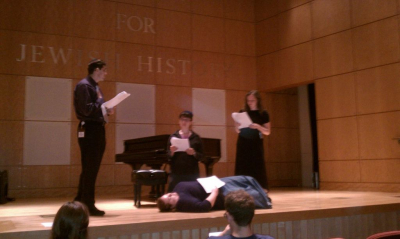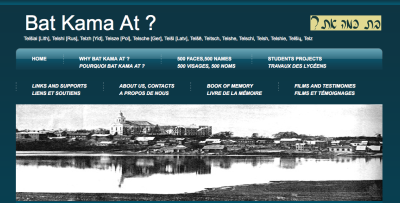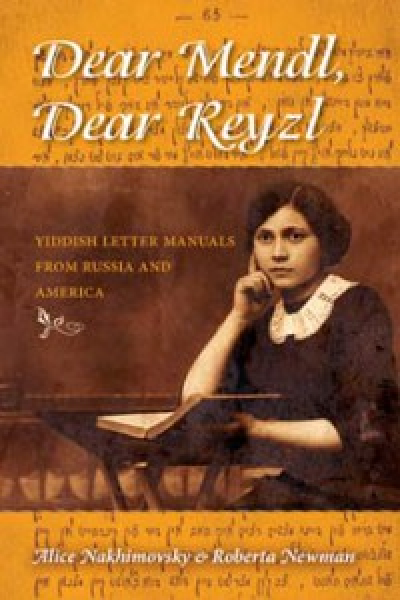News & Features
Newsletters | YIVO in the Media | Press Releases

YIVO’s Yiddish Summer Program Welcomes its 47th Class
by JENNIFER YOUNG
Every summer since 1968, YIVO’s Uriel Weinreich Summer Program has welcomed students of all ages and backgrounds to New York City, united in the common goal of immersing themselves in Yiddish language, literature, and culture. Our 38 students this year come from places such as France; China; and Boro Park, Brooklyn; as well as from Poland, Moldova, Ukraine, Russia, and Israel, and range in age from 17 to 74. This year, for the first time, the program is being held right here at YIVO, giving students even more opportunity to get to know YIVO, and for us to get to know them.
We began this past week by welcoming just our Elementary class, helping to ease the transition from their languages of daily use to a complete Yiddish immersion. One student told me that her teacher had assured her that within a few weeks, she would be dreaming in Yiddish. “Dreaming in Yiddish, can you imagine?” the student said to me. “Right now I’m just dreaming of dreaming in Yiddish!” Our faculty for the Elementary classes include Paula Teitelbaum, a native Yiddish speaker from Poland and a veteran YIVO Yiddish teacher; Sarah Ponichtera, a 2004 graduate of the summer program who now works as an archivist at the Center for Jewish History; and Eve Jochnowitz, also an alum, who runs our Elementary Yiddish classes during the year. Sheva Zucker, also a senior YIVO faculty member, joins us this year as academic advisor, meeting with the students individually and helping to tailor the program to match their needs.

Uriel Weinreich Summer Program in Yiddish Language, Literature, and Culture: Alumni Voices
This is the second post in a series about alumni of YIVO’s intensive summer program in Yiddish, offered by YIVO and Bard College. The program, which was established in 1968, is in its 47th year. This year’s session runs from June 23 – August 1, 2014. How I Invented My Own ...

Not to Let Them Sink Into Anonymity: Interview with Isabelle Rozenbaumas
Somewhere around 2008, the French/Brooklynite historian, filmmaker and translator Isabelle Rozenbaumas launched a project, Bat Kama At? (How old are you?), a historical, art, and educational project about the lives and fate of 500 girls from the Yavne Girls’ Gymnasium in Telsiai (known in Yiddish as Telz), Lithuania, where her mother was a student before World War II. The girls who remained in Telz during the Nazi occupation were massacred in December 1941.
Rozenbaumas’ project is multi-faceted. She has gathered documents, testimonies, and photographs from all over the world, seeking to identify as many of the girls and women from the Yavne school in Telz as possible. She has also worked with the Telsiu Vincento Boriseviciaus Gimnazija School, a Catholic high school in Telsiai, on a project in which students study interwar Jewish life and education in Lithuania. One of the ultimate goals of Bat Kama At? is an installation of 500 portraits of the Yavne students in the open air in Telz, that will be designed to later travel to other venues.
Read more about Bat Kama At? at its website and in this blogpost by Rokhl Kafrissen at Rootless Cosmopolitan.
Rozenbaumas is the recipient of a 2013-2014 Baltic Jewish Studies Fellowship from YIVO’s Max Weinreich Center. She was interviewed by Yedies Editor Roberta Newman.

The Fight Against the Jewish Religion in Russia (1965)
This broadcast from January 31, 1965 presents Harvard professor Dr. Erich Goldhagen delivering a paper, “The Fight Against the Jewish Religion in Russia” to the open session of the Social Science Circle at YIVO’s annual conference, which had taken place earlier that month. As a report on the conference in Yedies ...

YIVO in the News/Staff Notes – June 2014
On June 16, Steven J. Zipperstein, Koshland Professor in Jewish Culture and History at Stanford University and YIVO’s first Jacob Kronhill Visiting Scholar, delivered a keynote address in Budapest at the Central European University’s international conference “Narratives of Violence.” Professor Zipperstein’s lecture, drawn from research he conducted while at YIVO this past spring, was entitled “Inside Kishinev’s Pogrom: Hayyim Nahman Bialik, Michael Davitt, and the Burdens of Truth.”
On June 17, Cecile Kuznitz spoke on “YIVO and the Geography of Interwar Yiddish Culture” at the Emanuel Ringelblum Jewish Historical Institute in Warsaw.
On June 26, YIVO Senior Research Scholar Marek Web delivered a lecture, “The role of YIVO in Yiddish culture: Ponderings of a Jewish archivist” at the opening of an exhibition, The women’s section in the synagogue- women in Yiddish culture, at the Centre for Jewish Culture and Education in the White Stork Synagogue in Wroclaw, Poland.
YIVO Library Intern Michaela Walker has posted an article about the beginning of her summer internship at YIVO on a Bard College blog.

YIVO Participates in JudaicaLink Encyclopedia Project
The first release of The YIVO Encyclopedia of Jews in Eastern Europein Linked Open Data (LOD) format is now available athttp://data.judaicalink.org/data/yivo/YIVO. The goal of the project is to enrich online reference works and digital humanities in Jewish studies by creating a framework for new links between different encyclopedias and other ...

Uriel Weinreich Summer Program in Yiddish Language, Literature, and Culture: Alumni Voices
This is the first of series about alumni of YIVO’s intensive summer program in Yiddish, offered by YIVO and Bard College. The program, which was established in 1968, is in its 47th year. This year’s session runs from June 23 – August 1, 2014.

Newly Published Books Based on Research at YIVO
Every month, the YIVO Library receives complimentary copies of books whose content has been drawn in part from research done by the authors in the YIVO Archives and Library. Below is a partial list of books recently received.

2014 Jan Karski & Pola Nirenska Prize
The Jury of the Jan Karski and Pola Nirenska Award has the pleasure to announce that Mr. Piotr Matywiecki of Warsaw, Poland was named the recipient of the Karski Award for the year 2014. This annual award was endowed by Prof. Jan Karski in 1992 for an author of published ...

How to Live a Paper Life: Yiddish Letter Manuals from Russia and America
Say you're a woman living in a shtetl in 1900: what do you say in a letter to your husband in America if you think he's cheating on you? What about to your son to express your disapproval of how he's been letting his schoolwork slide in favor of hanging out with a bad crowd? Or how about to a friend to express your shock over the fact that you've heard he has a Christmas tree in his Jewish home?
These are sort of letters that Alice Nakhimovsky and Roberta Newman translated for their book Dear Mendl, Dear Reyzl: Yiddish Letter Manuals from Russia and America (Indiana University Press, 2014) and which they will present at YIVO on June 17, 2014 at 7:00pm. If you were a Jew in Russia or Poland or a new Jewish immigrant to America in the late nineteenth to early twentieth century and facing these and other dilemmas, you might find yourself turning for help to a brivnshteler, a Yiddish letter manual.




